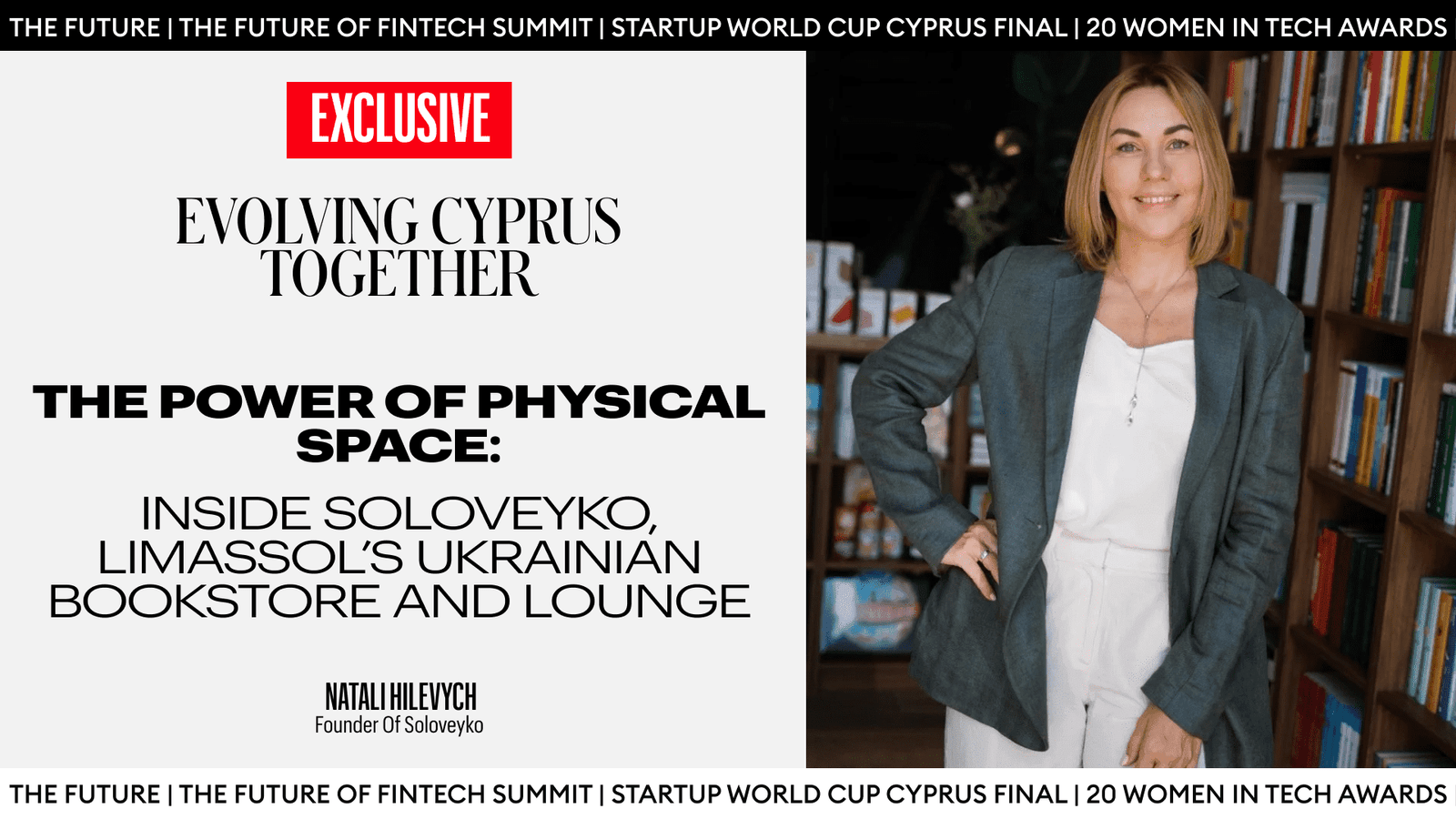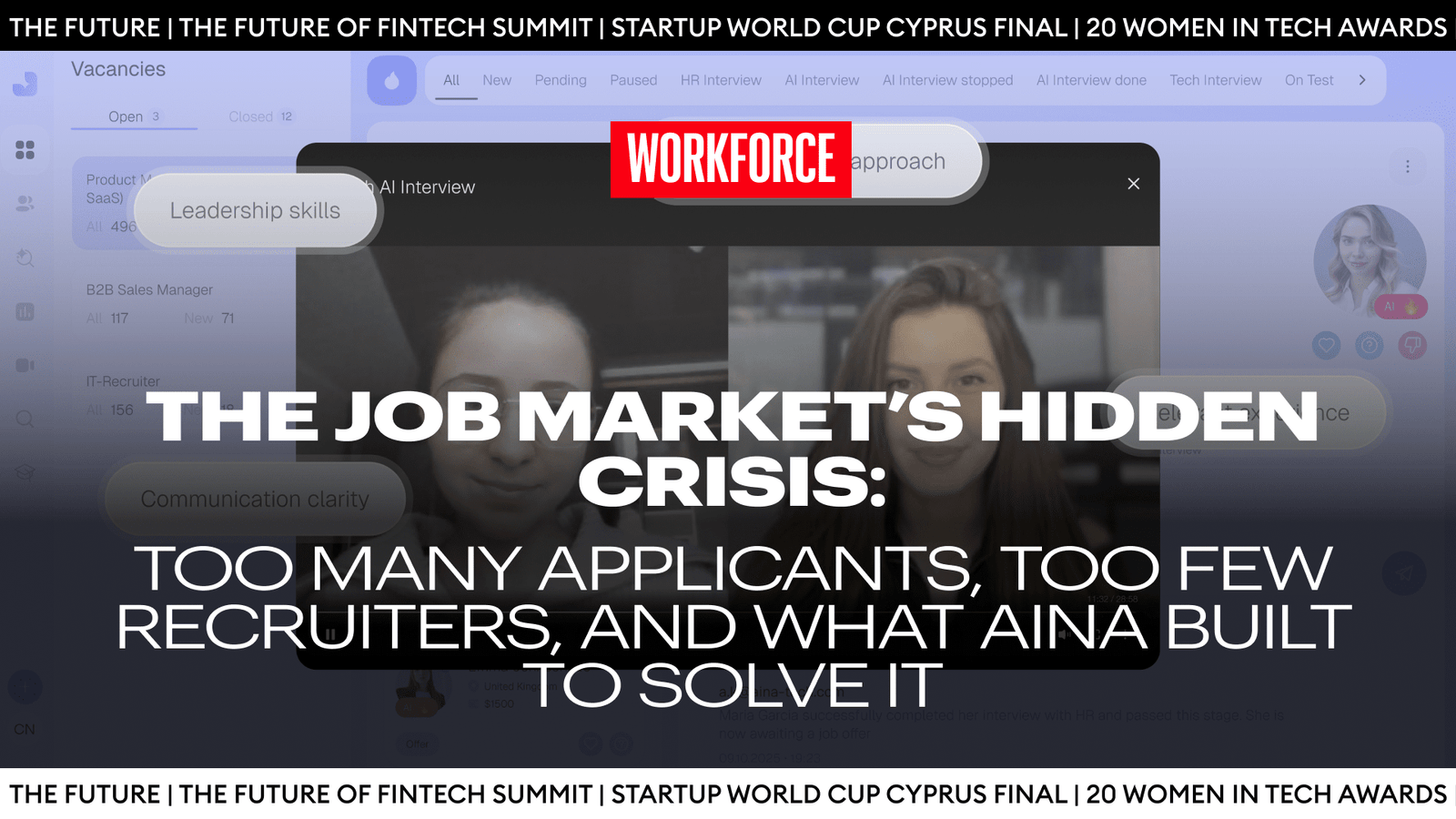Nestled on a quiet side street in Limassol, away from the towering buildings of tech and finance empires and the packed gastronomic affairs, a small lilac sign catches the light: Soloveyko: Book Store and Lounge. Two trees frame the door. A small coffee table sits outside the glass storefront.
Despite its size, you wouldn’t miss it. Not because of the bright blue frame around the glass, but because something else pulls you in. A story. A community. “It is a little Ukrainian home,” says Natali Hilevych, founder of Soloveyko.
Follow THE FUTURE on LinkedIn, Facebook, Instagram, X and Telegram
“You can come, and you don’t need to buy anything. You can read, sit on the terrace, drink coffee, and just have a chat.”
In February 2022, after Russia launched a full-scale invasion of Ukraine, Natali Hilevych relocated to Limassol with her family. For the next year, she tried to balance a full-time job, family finances, and staying connected to those back in her Ukrainian home. But the toll was too much. She took a sabbatical for her mental health. During that pause, she turned to books, only to discover how few Ukrainian titles were available in Cyprus, something many of the Ukrainian families she was meeting would also repeatedly mention.
In 2023, she put in her savings and, with practical help from publishers in Ukraine, opened Soloveyko as a Ukrainian-language bookstore that also functions as a community hub. It is a place for people from all walks of life to gather, share their experiences, connect, and find a place to feel at home.
In this interview with The Future Media, Natali Hilevych speaks about opening the doors at Soloveyko, the stories that people brought in, and how books in her native language keep it open for anyone who needs it.
Community, Language, Place
Across Europe, displaced people report higher rates of depression, anxiety, and PTSD than host populations. The World Health Organization calls for “accessible, low-barrier” support that is culturally inclined, meets everyday needs, and reduces stigma. Often, these spaces operate outside general clinical settings but in community-built settings. Being part of a community with a shared background, the WHO states, is associated with better mental health outcomes.
The UNHCR offers similar recommendations. Its Mental Health and Psychosocial Support guidance calls for the “(re)establishment of community initiatives” that build well-being. It lists “cultural and religious activities, self-help initiatives and support groups,” and encourages gathering in venues people already use.
In “Public libraries: A community-level resource to advance population health,” the authors argue that public libraries should be treated as a community-level resource for health. Libraries are “widely trusted” and provide an “opportune space for the coordination and delivery of health-promoting services.” That trust and reach make them suitable venues for activities that reduce place-based disparities.
Another research study from the UK describes libraries as community hubs for wellbeing. In a mixed-methods study, library users and staff called libraries a “safe place” that tackles loneliness and improves access to health and digital literacy. The study argues that libraries can host regular community-gathering activities that support mental and physical health.
Research on “third places” consistently reaches conclusions that are very much alike. These third places are everyday rooms that are neither home nor work, support interpersonal connections, and the building of community ties. They “enrich social interaction, sense of community, and belonging,” and can avert loneliness and stress. Libraries and book-centered spaces are included in this literature as part of the social infrastructure for community development.
Can you share a little about your background and the journey that brought you to Cyprus?
I spent many years in the corporate sector. I have experience scaling companies in technology and FMCG, and later in education. When the war started, my company closed very quickly. I moved to Cyprus with my family. At first, it was survival. Now, after three years, we feel it is our home, not a temporary shelter. We want to integrate, work with Cypriots, and give something back.
How did the idea for Soloveyko first come about?
After one year in Cyprus, I took a sabbatical from the tech world for my mental health. I wanted to find something meaningful for me, for my family, and for my country.
I started learning online, and I read more. In Cyprus, I could not find Ukrainian books. Other families told me the same. That was my first thought about opening a bookstore. I met friends in the community, and they told me it was a real problem. At first, my business mindset said this is too small a market and it’s not for you. You don’t have any experience in this sector. But my family encouraged me and promised to support me in running it. That’s what pushed me forward.
In 2023, I built a profit & loss plan to test revenue, costs and to see if the model could work. I wrote to publishers in Ukraine. They were so open and helpful, and answered all my questions. They gave us commercial terms. They offered help with assortment and logistics. And, slowly, slowly, we’ve built from that.
What does “Soloveyko” mean, and why did you choose it for the bookstore?
Soloveyko means ‘nightingale’ in Ukrainian. In Ukraine, people often call our language the ‘nightingale language.’ That is why I chose this name.
What was it like to open a bookstore in a new country, and what surprised you in the response?
It was easy and difficult at the same time. Easy, because I know how to build business relationships, processes, and a community. Difficult, because I had never built something only for myself. We started as a family online business. That meant we delivered orders ourselves. Then we opened the physical store. But it never felt like work. People would come into the store and share stories. Some of them were about loss, their old home, and about the future. Every day, at dinner, we came together as a family and shared these stories. It brought us together. And you know, it was never about the money from the beginning, but about helping people just like us.
After six months of work, we decided to host our first offline gathering and rented an event space. I came early to set up, wondering if anyone would come. I looked out the window, and there was a queue. People arrived two hours early to help us prepare for this celebration. It was beautiful.
We’ve attended the Nicosia Book Festival and Limassol Book Fair. There we saw how much support the Cypriot people gave us. They hugged us and said many kind words.
How did you go about funding Soloveyko?
There was no grant and no outside investment. It was my own money. We planned to build a house, but the war changed everything. I chose to invest in this project instead. I am happy with that choice. No apartment could give me so many emotions. I have learned that home is where your people are and not the building. I’ve found my home here.
How would you describe Soloveyko to someone who hasn’t visited yet? What kinds of books do you carry, and how do you choose them?
It is a little Ukrainian home. You can come in just to chat. You don’t need to buy anything. You can read on the terrace with a coffee.
We organize different events. In the past, we’ve hosted psychology lectures, art workshops, tastings with Cypriot producers, and family stories. We want to integrate our culture with Cyprus.
Everything on our bookshelf is in Ukrainian now. Maybe the next step would be to have more translations into Greek and English. We carry Ukrainian and world classics, fiction, and non-fiction. At first, publishers in Ukraine helped us build our list of titles. Now, every evening, we as a family research new releases and bestsellers. My husband is more into adult literature. I prefer children’s books. We also ask what people want to see and find books in those genres and categories.
Who is Soloveyko for?
Our core audience is Ukrainian families. In Cyprus, now we have about 20,000 Ukrainian people, and maybe 2,000 are our clients. Ten percent is a good marketing factor. But we also see many multicultural families. Sometimes one partner speaks Ukrainian or Russian and the other does not. It is a new audience for us. Children in mixed families often get their first Ukrainian book from us. The child is going to be exposed to Greek, English, besides Ukrainian at home, and it’s so important for them to connect to that culture.
It is not only Cypriot multicultural families. We meet Jewish, Russian, Belarusian, Polish, and German families.
We also get a lot of Cypriot men who want to buy a present for Ukrainian women. They tell us they are in love and ask for our recommendations. It’s very romantic. We even saw a pair become a couple on our terrace, and the books brought them together.
What are people asking for right now, and how do you help them choose?
We do not push bestsellers on people. We start by asking how you feel and what you want, because people in different moments need different books. Just like food. In the beginning, there was a lot of demand for psychology books. Books about how to live with loss and how to find yourself after trauma for our community, escaping the war. Now demand is changing, with more fiction, more thrillers, and many children’s books. Teenagers come and tell us what we should bring in next. We try to make each recommendation we give personalized.
Running an independent bookstore is never just about selling books. How are you thinking about sustainability in terms of business?
In terms of business, we plan carefully. We analyze demand and try to minimize risk. About 30 percent of our work is pre-ordered with our clients, often without upfront payment, so we keep stock tight.
For growth, we are testing a franchise model. We choose partners by values, not only by money. I declined a few partners who wanted only to make money from the business. This is so much more about community and giving back, and if our partners don’t value that, it won’t work. Now we have partners in Spain and in Germany. In Spain, the demand is strong, especially around Valencia and Alicante. In Germany, there is more competition in the Ukrainian book market, but it still works.
Our models start online. When the business sees demand, it can then think about opening an offline shop. This model is working very well.
Soloveyko serves a very defined cultural and linguistic community. How are you thinking about growing that audience here in Cyprus?
We join book fairs in Limassol and in Nicosia. This autumn is big for us with festivals and, maybe, more author presentations. We invite writers and hold events that help us integrate with Cyprus. I do not want the place closed only for Ukrainians. We want to give something to Cyprus and work together.
When it comes to marketing, we have a website and Instagram, and Google tools. It’s funny, though, that when we finally opened the physical bookstore, but still offered home deliveries, people actually said, No. They wanted to come to the shop and have a chat. To maybe browse for something else interesting. Most of our orders migrated from online to offline. Many people in Cyprus do not have social media, and word of mouth is strong.
About growth, I believe in the physical room. Technology is data-driven and very fast, but this project is about emotion. I think AI will never beat humans. Human relationships are most important. People want people.
When it is cooler, I hope people will feel comfortable sitting on our terrace, even with a Greek book, and read or have a coffee. Everyone is welcome because respect for different cultures is the first step toward peace.













